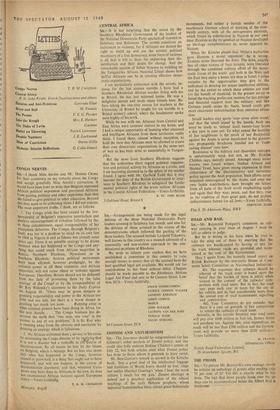Congo Nerves T. R. M. Creighton Central Africa R St.
John Reade. Enoch Dunthutshina and others Zionism and Anti-Semitism Gertrude Elias Road and Rail M. Francis Thy Proms F. E. G. Pirouet Into the Rough Mrs. E. Herbert Tht Duke of Levin Gardner Railer on Throwing Patrick Lawrence Double Numbers J. E. Lockwood Men of Conviction Darsie Gillie Molony: Interim Reflections G. Colin Jimack CONGO NERVES Sul,-1 thank Miss Ainslie and Mr. Mainza Chona for their comments on my remarks about the Congo and accept gratefully Miss Ainslie's correction. It Would have been truer to write that Belgium repressed African political expression and prevented Africans from gaining political and other experience than that she failed to give political or other education. Beyond this they seem to be criticising views I did not express. The most important truths. I think, are as follows.
1. The Congo crisis has been caused by the irre- 11PonsibilitY of Belgium's repressive paternalism and
Positive encouragement of tribalism followed by the,
in these circumstances, equal irresponsibility of her Precipitate defection. The Congo, through Belgium's
fault, was not in a position to stand on its own feet in 1960 as Nigeria is and as Ghana was already some Years ago. There is no possible analogy to be drawn between what has happened in the Congo and any- thing that could result from African majorities in Kenya, Northern Rhodesia, Nyasaland or in Southern Rhodesia. African political movements have been allowed, however grudgingly, by the colonial power in all these countries, and African majorities will not cause chaos or violence against Europeans. Therefore, Britain should not be deflected from her duty of promoting them by the false analogy of the Congd or by the irresponsibility of Sir Roy Welensky's statement to the Daily Expiess on August 10: 'There may be grave dangers in granting responsibility and power to the African too little and too late, but there is a worse danger in granting too much too soon. . . . Running away is what colonial powers have been doing in Africa for the past decade. . . . The Congo business has de- stroyed the myth that "one man, one vote" is the answer to any of our problems.' It is Sir Roy who Is running away from the obvious and inevitable by drawing an analogy which is fallacious.
2. No African statesman does a service to his cause by minimising the Congo disaster or by irwlying that it is not a disaster but a reshuffle in thrtourse of
decolonisation. By all means let him fix the blame on Belgium, where it belongs. But let him also stress
that what has happened in the Congo, however caused or provoked, is a thing that ought not to have happened, and will not happen, in the course of decolonisation elsewhere; and that, whatever Euro- peans may have done to Africans in the past, he does not countenance African violence against Europeans today.—Yours faithfully,


































 Previous page
Previous page